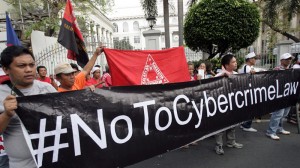Groups seek reversal of SC ruling on Cybercrime Prevention Act
MANILA, Philippines—A petition seeking a reversal of the Supreme Court’s ruling affirming the legality of the majority of the provisions Cybercrime Prevention Act snowballed Thursday.
The groups which filed separate petitions with the high court include the National Union of Journalists of the Philippines (NUJP), Philippine Bar Association (PBA), Bayan, Bayan Muna, Bloggers and Netizens for Democracy (BAND) and the group of journalist led by Alexander Adonis and the Center for International Law.
In a 5-page motion for partial reconsideration, the NUJP, Center for Media Freedom and Responsibility, the Philippine Press Institute urged the high court to nullify questionable provisions of the Cybercrime law specifically the online libel.
“It is respectfully prayed that the Decision be reconsidered, and online libel in Section 4 (c) 4 be declared unconstitutional in regard to the original author, and Sections 14, 15, 24 and 26 (a) be similarly invalidated for violating separation of powers, as undue delegation of judicial and legislative powers,” the petition filed by the group’s legal counsel, Jose Manuel Diokno and Pablito Sanidad, said.
Section 14 is about disclosure of computer data while section 15 is about search, seizure and examination of computer data. Section 24, meanwhile, is about the Cybercrime Investigation and Coordinating Center and section 26 is about its powers and functions.
In their petition, the groups insisted that online libel is “unconstitutional,” not only about those who receive or react to a post but also about the original author of the post.
“In its Decision, the Honorable Court upheld the constitutionality of online libel, by declaring that Section 4 (c) (4) which penalizes online libel, is constitutional in regard to the original author of a post, though not in regard to those who merely receive the post or react to it. Petitioners beg a second look upon the matter,” the petitioners said citing Article III of the Constitution, which guarantees freedom of speech, of expression, or of the press, or the right of the people to assemble and petition the government for redress of grievances.
The NUJP, together with the Adonis, cited the International Covenant on Civil and Political Rights where the Philippines is a party.
“Journalists shouldn’t be made to kiss steel bars just because they are doing their job,” Adonis said.
Lawyer Harry Roque, Chairperson of Centerlaw stated, “As a civilized country, we should be complying with the UN Human Rights Committee view. We are violating our constitution and the Philippine state obligations.”
BAND, meanwhile said “the court should join Filipinos in making sure the Philippine portion of the Internet remains free. We wish to celebrate the 20th anniversary of the Philippines’ first live Internet connection which happened on March 29, 1994, in complete freedom and sans the chilling effects of this badly-crafted and unconstitutional law.”
BAND is also asking the court to strike down the following provisions as unconstitutional for blatantly violating multiple clauses of the Constitution including those on Free Speech, Due Process, Against Double Jeopardy, and Equal Protection: Section 4(c)4 on libel and the libel provisions of the Revised Penal Code; Sec. 5 on aiding and abetting in the commission of cybercrime, and attempt in the commission of cybercrime; Section 6 on the application of the Cybercrime Law on the whole Revised Penal Code and the application of a heavier penalties; and Section 7 on liability under other laws.
On the other hand, militant group Bayan Muna said the online libel provision of RA 10175, as well as Article 353, 354 and 355 of the RPC should be declared as void for being unconstitutional.
“The fact that the Honorable Court clarified that online libel applied to original authors but not to “likers” or “commenters” was already a “judicial recognition that said penal provision is overbroad,” Bayan Muna’s 97-page motion said.
The group also explained that Section 15 of RA 10175 (power and duties of law enforcement agencies) should also be declared unconstitutional since it “gives undue powers functionally equivalent to a subpoena against any person who lies outside the scope and description of the warrant.”
Earlier, the Kabataan and Alliance of ACT party-list groups also asked the high court to reconsider its ruling on the online libel provision of RA 10175.
RELATED STORIES
87% of Filipino Internet users have been victims of cybercrimes
Poe: Child porn underscores importance of cybercrime law
